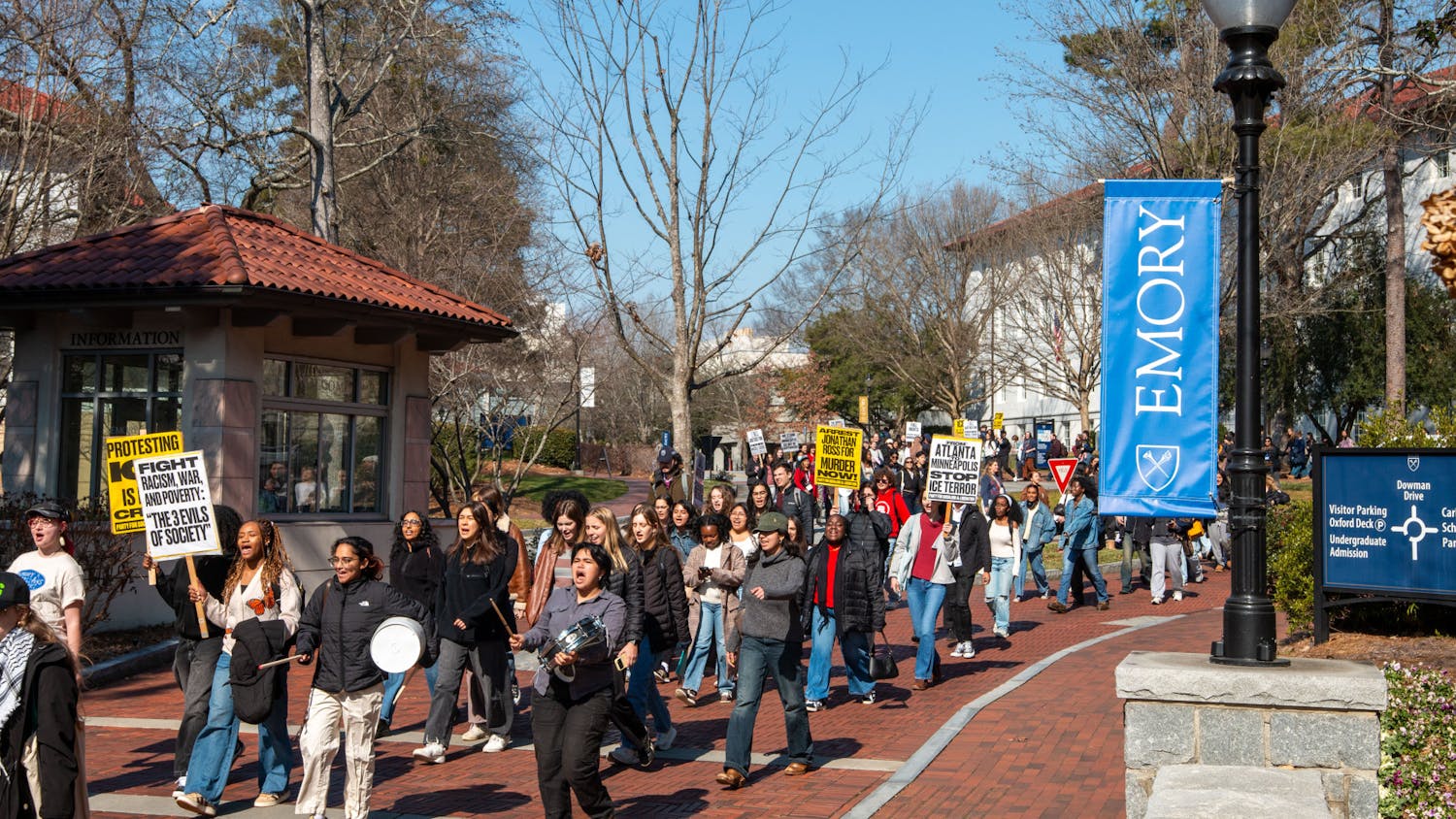In a unanimous verdict of the April 11 hearing for Friese v. SGA, the Constitutional Council held that the Board of Elections has not “seriously violated” the Student Government Association (SGA) Constitution or “greatly misused” their powers in creating the Spring 2022 SGA presidential run-off election or determining the procedure following “a no confidence” victory.
The Council determined that SGA Attorney GeneralStewart Zelnick (20Ox, 22C), SGA President Rachel Ding (20Ox, 22B) and SGA Staff Advisor Lisa Loveall were valid to choose to follow the line of succession and promote vice president-elect Noah Marchuck (24C) to the position of president-elect after the “no confidence” win in the March 29 run-off elections left the presidential office vacant.
“I was satisfied with the opinion overall,” plaintiff Emma Friese (24C) said. “I thought the refutations… were very fair.”
However, the Council also wrote that due to the Constitution’s “vagueness” surrounding procedures in the case of presidential vacancies, the Board of Elections is within the right to choose to organize a new spring election cycle for a vacant presidency, though they are not obligated to do so. Since executive elections must be held in the spring, according to Part III, Article 1B in the SGA Code of Elections, the Elections Board would have only 10 days until the end of the semester to organize a new election.
In the event that the Elections Board determines there is insufficient time to hold the new election, the Constitutional Council wrote that the “line of succession becomes the primary (and only remaining) course of action.”
The Council ordered the Legislature and Board of Elections to deliberate and inform the student body whether they plan to hold a new election for SGA president or invoke the succession line following the end of the 55th SGA term.
Friese said she hopes the Board of Elections decides to hold another election to give students a chance to directly vote on the next sitting president, and believes the rest of the student body would say the same.
“If there was another election, that would really cement the trust between the Emory student body and the new president,” Friese said. “Right now, everyone is in a state of confusion.”

Despite the overall affirmation of the Board of Elections’ actions, the Council also noted that the Board did not act within its powers when they announced to the student body via email that Marchuck would assume the office of presidency. The Council clarified that instigating and announcing the succession should have been the role of the attorney general. However, the Council held that this act was a “minor violation” and declined to issue a course of action.
The Constitutional Council recommended that the legislature must act to rectify “inexcusable vagueness in Emory’s governing documents,” stating that while they had not significantly violated the Constitution or the Code of Elections, they had violated “the Emory student body’s trust by failing to resolve ambiguities in its governing documents for years on end.”
“I was also very surprised but delighted in that the frustration of the Council was very palpable at the end of this opinion,” Friese said. “It was a bit of a relief, because that is the frustration I felt that pushed me to bring this case, so it felt very validating.”
The Board recommended that the Legislature should clarify whether “no confidence” must receive a majority or plurality of votes to win, as well as specifically amend Part III, Article 2 of the Elections Code to clarify “how a ‘no confidence’ victory in an SGA presidential or vice presidential election should be handled.”
The Council also noted that, in cases of absence of the president, the Legislature should further define the executive vice president’s powers as acting or temporary president.
Friese said she was “thrilled” to see the Council make recommendations to change the governing documents.
“I was really happy that it wasn't just a few things,” Friese said. “It was a lot of things about not just adding, 'Oh, no confidence needs to be specified plurality or majority,' but some things that were more ambiguous and maybe tangential to this case, but were still alarming to me.”
The Council’s decision was made by Chief Justice Ben Thomas (23C) and Associate Justices Jane Wang (22C), Sarah Gordon (22C), Pavel Ramirez (23C), Madeline Bryce (21Ox, 23C) and Mari Ismail (24C). Associate Justice Kardelen Ergül recused herself from the case.
The Board Elections held the trial after plaintiffs Friese and Sruti Kumar (20Ox, 22C) submitted a challenge on March 31 to the Constitutional Council, alleging that the Board of Elections misused their interpretative authority and did not act in accordance with the Constitution by holding the run-off election between “no confidence” and former SGA presidential candidate Alyssa Stegall (21Ox, 23C). The SGA elections advanced to a run-off after no candidate won more than 50% of the vote.
Friese said her decision to submit a challenge did not stem from a personal issue with SGA. It was an attempt to resolve the lack of procedure for a “no confidence” win in the SGA governing documents, which she believed to be a serious issue.
“It's hard when it says Friese v. SGA to get that connotation across, but it's really like, 'Friese trying to help amend some of the SGA documents,’'' Friese said. “Unfortunately, doing this dramatic forestall with the Council was, I felt, the only effective way to do it.”
Friese and Kumar claimed that the Board of Elections’ decision to follow the line of succession in filling the vacancy was unconstitutional because it was not written in the SGA Constitution or the Code of Elections. The Council noted that the SGA Code of Elections states that, in the event of a “no confidence” win, the position is considered vacant and the rules of the individual governing body should be followed. However, the SGA Constitution does not provide guidance on what to do in the event of a presidential vacancy, so the Board “had no choice but to rely on the current president, attorney general and staff advisor’s interpretation of the line of succession.”
In response to Friese and Kumar’s allegations of the unconstitutionality of the run-off elections, the Council ruled that ‘no confidence’ should be treated the same as any other candidate on the ballot.
“In all other cases where no candidate for SGA president wins a majority of votes, a runoff between the top two choices must take place,” the Council wrote, citing Part VI, Article 3D of the Code of Elections.
The Council also cited past precedent for a run-off between a candidate and no confidence, such as the 2021 BBA Council SGA representative run-off election between Sophie Nathanson (23B) and “no confidence.”
In response to Friese and Kumar’s claim that the lack of procedure in SGA governing documents causes a “constitutional crisis,” the Council wrote that although they agree that their documents are “ambiguous” and “must be revised,” Zelnick was correct to argue that the documents never mention the term “constitutional crisis” and the Board of Elections acted within its authority to best interpret any ambiguities regarding the SGA Constitution’s line of succession procedures.
Kumar and Elections Board Chair Mild Trakarnsakdikul (19Ox, 22B) did not respond for comment by press time.
Update (4/16/2022 at 5:45 p.m.): This article was updated to include comments from Emma Friese (24C).

Madi Olivier (she/her) (25C) is from Highland Village, Texas, and is majoring in psychology and minoring in rhetoric, writing and information design. Outside of the Wheel, she is involved in psychology research, the Emory Brain Exercise Initiative and the Trevor Project. In her free time, you can find her trying not to fall while bouldering and obsessively listening to Hozier with her cat.







